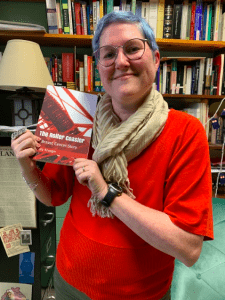Faith Diaz Contributing Writer
Associate Professor of English, Misty Krueger, recently released her new memoir, “The Roller Coaster: A Breast Cancer Story.” Her collection traces her breast cancer journey in various pieces of prose, poetry, and essays.
The book was written over the course of Krueger’s discovery of her cancer, her diagnosis, appointments, surgery, and more. Different pieces of the text range in times of their creative origin, some having been written in real time as they were happening to her or as reflection after the events had passed.
“Roller Coaster,” according to Krueger, “traces a year in the life of a cancer patient, particularly someone with breast cancer and the treatment that she, I, received and how I dealt with that as a life changing experience.”
As the reader moves through the text, the story traces a linear timeline of Krueger’s life via realizations she has about her body. From being a young woman who did not consider the possibility of physical pieces of her body being removed, to an adult put into the place of having to make many quick decisions in order to save her life.
“I follow that course through my decision to have or not have reconstruction, to have or not have chemotherapy, undergo radiation, to go on medical leave, and then the fall out of that whole experience combined,” Krueger said.
She described the mental toll that the experience took on her and the common misconceptions that the general public has about what it was like to live inside of a body that had cancer. “It is the whole person that is affected; its body, spirit, soul, mind, it’s everything.”
The story traces through all of these facets of Krueger as well as her teaching career at UMF. “I feel I would not have made it through this experience without the support from UMF,” she said.
When she was diagnosed in early 2018, a smaller group immediately took to showing Krueger how much they wanted to support and care for her throughout this difficult time in her life. She said, “People were reaching out to me and doing this in material ways like bringing me cookies, putting signs on my door, sending me cards, and also you know just telling me, ‘We’re here for you,’ ‘We love you,’ and ‘No matter what, you’re going to make it.’”
Krueger cites this positive energy, teaching, her family and more as being essential to her healing process. Her dedication to loyalty to these elements of her life were obvious in her pursuit to keep them close to her throughout her illness. “I knew that, that community would actually give me strength but, it turns out, my body was stronger than my will.”
As her illness progressed, Krueger grew weaker and against her usual ambitious nature, her teaching performance was affected. “I taught a month into the fall semester of 2018 and I just woke up one morning and knew I couldn’t do this to myself anymore or my students,“ Krueger said. “I wasn’t giving them the Misty Krueger experience.”
Through these series of realizations about what her illness meant for the other factors of her life, the UMF community stayed right by Krueger’s side even after she stopped teaching on campus. “I saw people from campus, they’d either come to me or I’d come here and mostly it was social media that really kept that community alive for me.“
Krueger heard from her friends, students and colleagues alike through social media like Facebook and Twitter. Even when she could not physically see her friends due to treatment they continuously made sure she got their message. “I just felt so loved. I felt excited to come back.”
That excitement stayed with Krueger as she survived her illness and began her recovery.
“It helped me get through radiation which I was going through as I was teaching and the transition to the drugs that I have to take for 10 years to stave off the cancer. Being here helped me get through that. I can’t tell you how grateful I am for everyone here,” Krueger said.
During her treatment and upon her arrival back into the UMF community in the spring of 2019, Krueger had been continuously writing about her experience with breast cancer, for which she found a wealth of support to publish her work.
Upon the book’s release, an education class utilized the text as part of an in-class analysis. On Nov. 6, Krueger visited class to talk about her experience and answer any questions that students may have had.
Students were intrigued by how Krueger could publish something that had detailed descriptions of her body and mind, and were awed at how she could be so vulnerable on the page. One student, Christine Destephen, asked, “How did you deal with putting the book out and exposing yourself?
Krueger said, “I will tell you my husband did not want me to write this book. He said, “This is too much, you are exposing yourself, You are going to let people read this? Especially strangers?’”
It was more than the idea of strangers reading her work that concerned Krueger’s husband. “Even worse for him was people we knew because he thought, ‘Strangers can read it, that’s whatever. The people you know, now they really know you, stuff about you they don’t want to know, are afraid to know, stuff that might traumatize them.’”
Krueger still wanted to write the book because she thought that in a way, that was exactly the point. “If we don’t talk about these things, if we keep all of this stuff a secret, then no one else will talk about it and we are all suffering alone,” she said.
As the class continued to ask their questions it was obvious that Krueger’s unique story was not only about her anymore, as she said, “It is about me and my story but there are other peoples’ lives that come into play because they are close to me.”
And with that closeness, for those that have since read her book, there are lives that have been affected and people that have found pieces of themselves within Krueger’s pages.
An unnamed student in the course had struggled with her own surgery and illness of a Cardiovascular variety and found Krueger’s description of coming out of surgery in this surreal wonder and uncomfortable state of surprisingly being alive, to be a spot-on representation of the experience. She ended her comment to Krueger simply with, “Thank you for writing this book.”
Krueger’s self-published book can be purchased on Amazon.

